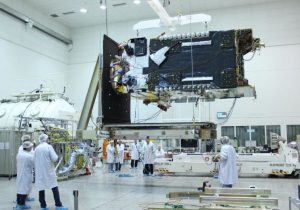
Shareholder’s of Israel’s Spacecom, operator of the Amos fleet of commercial communications satellites, announced on 24 August 2016 that they has agreed to sell the company for U.S.$285 million to Chinese telecommunications company Beijing Xinwei Technology Group Co. Ltd.
It is believed that the sale will proceed, subject to Israeli government regulatory approval, once Spacecom’s Amos-6 communications satellite is successfully launched by a SpaceX Falcon 9 space launch vehicle on 3 September 2016. The Amos-6 launch has been on hold for two years.
Spacecom will be integrated into a Luxembourg-based company called Luxembourg Space Telecommunication S.A., and the actual sale will be handled by Big Bird Ltd., an Israeli-based company. Both Luxembourg Space Telecommunication S.A. and Big Bird Ltd. are owned by Beijing Xinwei Technology Group Co. Ltd.
By using Big Bird Ltd. to handle the sale Spacecom shareholders and Beijing Xinwei hope to keep an Israeli presence in the company.
Spacecom shareholders have been trying to sell Spacecom for several years now, with one recent potential sale to Hispasat falling through at the last minute due to regulatory issues.
Spacecom’s Chief Executive Officer, David Pollack, said in a statement that, “Further to contacts with various entities, the negotiations with the Beijing Xinwei Group matured into this transaction, reflecting a substantial premium on the market price. Beijing Xinwei is a strategic partner, expert in the field of telecommunication, planning to expand its business in the communication satellites field. The merger will provide the Company with financial strength, and will enable further development and growth. The transaction is performed in accordance with Space Communication’s license terms, stipulating, inter alia, that the satellites will be operated from Israel, and that the Company shall remain an Israeli company, regardless of the identity of the shareholders of the Company.”
According to Spacecom’s shareholders, Beijing Xinwei is, “a Chinese conglomerate with vast global operations, inter alia, in the USA, Ireland, Russia, Nicaragua, Brazil and more. The company provides solutions to telecom providers, and active in the cellular communication field, equipment sales, and communication satellites. The company is traded on the Shanghai Stock Exchange at a market price of US$ 7.6 billion, and its balance sheet present assets in the amount of US$ 2.7 billion. Xinwei was incorporated in December 1995, by two telecom researchers, Chen Wei and Xu Guanhan and other entities. Xinwei’s headquarter is located in Beijing, China.”
Among the issues that will likely be considered by Israeli regulatory authorities before approving the sale of Spacecom to Beijing Xinwei will be the use of the Amos satellite fleet by the Israeli Defence Forces (IDF) and the impact on Israeli national security and its relationship with the United States of the sale to a Chinese company.
The commercial communications satellite industry is undergoing a round of consolidation at present in an increasingly tight market, and Spacecom has found it increasingly tough to compete. The sale to Beijing Xinwei – an experienced telecommunications operator – will undoubtedly help the Amos fleet become more competitive, but it should also be noted that Amos-6 will have considerable coverage of Sub-Saharan Africa, a region where China has significant strategic and economic interests.
Published original at: http://www.spacewatchme.com/2016/08/israels-spacecom-sold-chinese-group-launch-amos-6
 SpaceWatch.Global An independent perspective on space
SpaceWatch.Global An independent perspective on space

